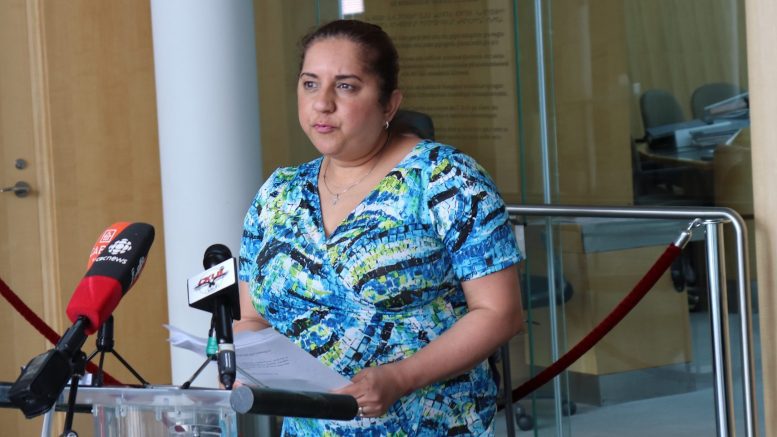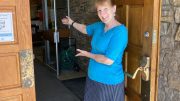In an effort to slow a multi-community COVID outbreak, mask wearing will be mandatory for indoor settings in the Northwest Territories starting tomorrow.
The outbreak that began in Fort Good Hope has now spread to nine other communities, says Dr. Kami Kandola, the NWT chief public health officer.
There are 247 active cases in the territory; 89 in Fort Good Hope, 75 in Colville Lake, nine in Délı̨nę, 29 in Norman Wells, one in Inuvik, one in Fort Smith, one in Gamètì, three in Hay River and K’atl’odeeche First Nation, three in Fort Providence and 36 in Yellowknife.
Norman Wells has been placed in a containment order due to community transmission.
“Previous recommendations have not been effective,” Dr. Kandola said, “with the wastewater signals and what we’re hearing around potentially breaches in compliance, that means [Norman Wells has] a significant higher exposure risk, so we had to do the containment order to bring it under control.”
Dr. Kandola says Yellowknife is at the beginning of community transmission, but she is hopeful the mask mandate and “aggressive” contact tracing will prevent it from being placed under a containment order.
The containment orders issued for Fort Good Hope and Colville Lake have also been extended another 10 days, until Sept. 4.
Red Cross nurses are currently being trained in the territory, something Dr. AnneMarie Pegg, the territorial medical director, says will help manage the outbreak, but she added the majority of work is being completed by NWT staff.
Testing and contact tracing
The territory has reported more cases in this outbreak than in the entire pandemic. As a result of multiple exposure locations in multiple communities, testing has increased drastically.
Dr. Pegg says the territory has been able to keep up with the testing required, but has begun using a priority method.
“I’m very proud to say that, despite the huge volume of testing, and contact tracing going on, the staff are doing an excellent job,” she said. “We have implemented in some situations a prioritization of testing, to ensure that those people who are the most likely to be infected, and furthermore, the most likely to become severely ill get tested in priority.”
She adds staff have been able to test all residents who have been at exposure sites or close contacts to a positive case.
Dr. Pegg said there have been under five hospitalizations and that the NWT’s hospital capacity is “adequate for the number of patients.”
But Dr. Kandola did mention the unique issues the territory faces as it combats the outbreak.
“The situation in the NWT is very different in some ways. We do not have the resources that larger centers and citizens have in the south,” Dr. Kandola said.
A sad milestone
After 531 days in a global pandemic, the NWT reported its first COVID-related death on Tuesday.
This was 92-year-old Fort Good Hope Elder Gabe Kochon.
Without mentioning him by name during the press conference, Premier Caroline Cochrane, cabinet ministers and health officials all issued their condolences to the family of the deceased.
“We’re all thinking about you during this difficult time,” Cochrane said.
There was one positive note in the press conference, as Premier Cochrane credited NWT residents for hitting a 75 per cent fully vaccinated rate.
Health officials talked about the vaccine being the best defence against COVID-19, but added extra precautions including masks and distancing will be needed to end the current outbreak and prevent further spread to more communities.
“We don’t know what community COVID is going to show up next in,” Dr. Kandola said.
The outbreak is the result of the Delta Variant, which some scientists estimate is 50 per cent more transmissible than earlier versions of the virus.
The Delta Variant also infects people quicker than others, Dr. Kandola says.
This has led to changes in testing for travellers entering communities and those who work with vulnerable populations. They will now be tested on day eight instead of 14.









